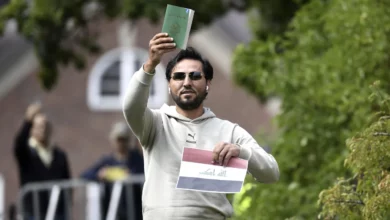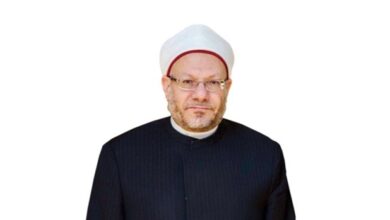On Monday night AUC’s Oriental Hall was packed with scholars, students and journalists for a lecture by prominent academic Joseph Massad. The lecture, “Translating Islam,” was based on research for his upcoming book, tentatively titled “Geneologies of Islam,” which traces the historical development of Islam as a word and concept.
The lecture is part of the ongoing series “In Translation,” which is hosted by AUC’s Center for Translation Studies. Launched in December 2009, the series has featured a number of well-known translators including Denys Johnson-Davies, Humphrey Davies, Egyptian author and translator Ahdaf Soueif and author Khaled al-Khamissi along with his translator Jonathan Wright.
Massad, who is Jordanian of Palestinian descent, is a Professor of Modern Arab Politics and Intellectual History in Columbia University in New York. His previous works are "Colonial Effects," a study of colonial and post-colonial constructions of nationalism in Jordan, "The Persistence of the Palestinian Question: Essays on Zionism and the Palestinians," and "Desiring Arabs," which examines discourse on sexuality.
Massad began by discussing the broader context for translation between Arabic and English, arguing that while translation is often perceived as opening doors between languages, it can also sharpen the definitions of words and promote an ideology. He saw this following 9/11, for example, when the American government rushed to fund translation of works it thought would bring about cultural change in the Middle East.
Massad then discussed the “untranslateable"–the idea that some words are so rooted in a given culture that they cannot be translated. Massad said sometimes the cultural attachment is oversimplified; words like Allah, jihad and hijab, which are generally left in the Arabic, are not tied exclusively to Islamic cultures. Jihad is a common name among Christian Arabs, and is understood to mean “struggle,” according to the professor, who added that Allah means “God” to Arabic-speaking Jews and Christians. The fact that the Prophet Mohamed’s father was named Abdallah, Massad continued, proves the word Allah was part of the Arabic language before Islam. Here, Massad said, the question becomes about how we think about translation. “Is it about about respect for difference, or about emphasizing difference?”
Massad then focused on the word Islam, and on Orientalists, who attributed various meanings to the word–often without definition or explanation–and switched between meanings within one text. For such scholars, the word Islam could mean the history of various or all Muslim states, a specific individual or scholar, a set of customs and norms, a community, the Quran and the hadith as well as commentaries on both.
Massad argued the proliferation of meanings changed the way Arabs and Muslims talked and thought about Islam, and often, in a relatively new development, led them to feel the need to defend Islam in all its definitions. Arab authors, in spite of writing a great deal about religion, rarely used the word Islam in book titles until the 19th century, according to the professor. In fact, Massad explained, the word is not frequently used in the Quran itself, which emphasizes eman or "faith," calling upon people as mu’mineen, "believers," and not as muslimeen.
As use of the word Islam grows, Massad said, so does the creation of loaded antonyms like “freedom,” “modernity,” and “democracy”–less than subtle and less than informed condemnations of Islam. A journalist in Qatar once summarized local educational reforms as “less Islam, more English.”
Massad’s planned book will trace the genealogy of Islam’s many meanings, the history of “how Islam changed from a din to a pedagogical project,” the process of “rendering Islam into a culture, a civilization, a code of public conduct, even a type of governance.” This approach shows that the definition of Islam in modern languages, including Arabic, is not fixed, but something that has been created, developed and influenced by historical actors over time. Massad highlighted the colonial and Orientalist discourses as particularly crucial in this process, as well as Ottoman reform projects, the Muslim Brotherhood, and the Islamic Revolution in Iran. He sees the view of Islam as monolithic and unchanging as part of “the attempt to see Arabs and Muslims as living in a time warp.”
According to Massad, “any attempt to understand the current situation must start by examining the history of present uses of Islam, and how it has come to be ahistoricized. The term has become a repository of meanings. Without such history, we may fall into the traps set by the ongoing war of worlds, or war of words, about who gets to control what Islam means and what Islam should mean.”




